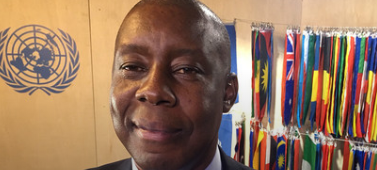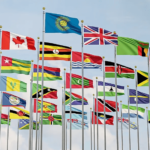Theko Tlebere
I recently read an article written by a fellow Mosotho expressing concerns about the government’s substantial investment in Joshua Phoho Setipa’s candidacy for the position of Secretary-General of the Commonwealth. The article questioned the rationale behind allocating millions of maloti to support one individual’s pursuit of an international role, particularly in a nation grappling with high unemployment and poverty. While the author’s concerns are appreciated and well noted, it is important to consider the implications and potential benefits of this investment. In this response, I aim to highlight the bigger picture – how the government’s strategic move, even if Setipa’s candidacy is unsuccessful, can still bring significant long-term advantages for the country. By examining the potential outcomes and the value of having a Basotho leader in such a prominent international position, I hope to provide a more comprehensive perspective that underscores the importance of this initiative for Lesotho’s future on the global stage.
In this response, I will address four key points: the value of high-profile international roles, addressing concerns about resource allocation, learning from past experiences, and the potential benefits for the Basotho people. By examining these aspects, I hope to offer a more comprehensive perspective that highlights the importance of this initiative for Lesotho’s future on the global stage, regardless of the outcome of Setipa’s candidacy.
The Value of High-Profile International Roles
Firstly, it is essential to recognise that the role of Secretary-General of the Commonwealth is not merely an individual achievement but a position that holds significant influence across 56 member countries. This role provides a platform to advocate for the interests of small and developing nations, including Lesotho. Although the article questions the immediate impact on unemployment, it is crucial to understand that international influence can result in long-term, systemic changes that benefit the entire country. For example, a Mosotho leader in such a position could work towards fostering partnerships, attracting investments, and influencing policies that support economic growth and job creation in Lesotho. The visibility and prestige associated with such a role could enhance Lesotho’s global standing, making it more appealing to investors and development partners.
Addressing Concerns about Resource Allocation
The article accurately points out that Lesotho is a least developed country with limited resources, and therefore, the allocation of resources should be carefully considered. However, the investment in Setipa’s candidacy should not be viewed simply as securing employment for one individual. Instead, it should be seen as a strategic move to position Lesotho favorably on the global stage. While the concern about opportunity costs is valid — resources spent on the campaign could have potentially been used for other initiatives such as entrepreneurship programs or infrastructure projects — it is important to note that these investments are not mutually exclusive. The government can and should continue to address domestic challenges while also pursuing opportunities that can yield long-term benefits for the nation. Securing a leadership position in an influential international organisation could open doors that lead to increased funding, technical assistance, and trade opportunities for Lesotho.
Learning from Past Experiences
Acknowledging and objectively evaluating past experiences is crucial for understanding their true impact. The article raises doubts about the tangible benefits of Ntate Setipa’s previous roles, especially his tenure as Managing Director of the Technology Bank for Least Developed Countries. However, it is important to set the record straight. Firstly, during his time as Managing Director, Setipa played a vital role in launching the Lesotho Academy of Science, which is now fully operational at the National University of Lesotho (NUL). This achievement filled a significant gap as Lesotho was previously one of the few countries without an academy of sciences.
Secondly, thanks to Setipa’s efforts at the Tech Bank, many Basotho students are now studying industrial design in China. He secured over 45 scholarships for students from least developed countries, providing previously unavailable opportunities and contributing to the education and skill development of young Basotho. Additionally, under Setipa’s guidance, the Tech Bank conducted extensive research in Lesotho to identify barriers to innovation. This research is essential for understanding the country’s challenges and forms the foundation for current strategies aimed at fostering innovation and economic growth.
Lastly, during the COVID-19 pandemic, Setipa, as Managing Director, made a direct and tangible contribution by donating over 100,000 pieces of PPE to support the government’s efforts in combating the virus. These examples demonstrate that Setipa’s previous roles have indeed brought significant benefits to Lesotho. His leadership and initiatives have had lasting impacts, countering the suggestion that his past positions have been unbeneficial to the country. It is crucial to consider these achievements when evaluating his potential to bring even greater benefits to Lesotho as Secretary-General of the Commonwealth.
However, it is equally important to recognise that different roles have different scopes and mandates. The position of Secretary-General of the Commonwealth offers a broader platform with more significant potential for impact. Moreover, the effectiveness of any international role in benefiting a home country depends on how well the individual in that role can leverage the position to secure resources, partnerships, and favorable policies. If Setipa succeeds in his candidacy, clear strategies will be in place to ensure that his role brings tangible benefits to Lesotho, such as advocating for initiatives that directly address unemployment, poverty, and inequality.
The Potential Benefits for the Basotho People
The article raises a critical question: “What do we stand to gain?” The answer lies in the potential indirect effects of having a Mosotho leader in such a prominent role, which could bring significant benefits to the nation. Let’s delve deeper into how these benefits might manifest:
1. Enhanced International Cooperation:
As Secretary-General, Setipa would have the opportunity to strengthen Lesotho’s relationships with other Commonwealth nations. With 56 member countries, the Commonwealth is a diverse group where the Secretary-General plays a vital role in facilitating cooperation. Setipa could use his position to advocate for and negotiate bilateral agreements that benefit Lesotho, leading to increased trade, investment, and technical assistance. For example, improved trade agreements could open up new markets for Lesotho’s products, stimulating the economy. Additionally, closer ties could attract more investment from Commonwealth nations into key sectors of Lesotho’s economy, such as agriculture, manufacturing, and tourism, fostering sustainable economic growth.
2. Advocacy for Developmental Issues:
As Secretary-General, Setipa could prioritise critical issues for Lesotho, such as poverty alleviation, education, and health. His advocacy could ensure that these topics receive consistent attention in Commonwealth programs and initiatives. For instance, he could push for increased funding and resources to support educational programs in Lesotho, or advocate for health initiatives addressing issues like HIV/AIDS and maternal health. By placing Lesotho’s developmental needs on the Commonwealth’s agenda, Setipa could attract international attention and resources, helping to address pressing challenges faced by Basotho.
3. National Pride and Inspiration:
Having a Mosotho leader in such a high-profile international position can foster a strong sense of national pride and unity. This achievement can serve as a powerful symbol of what is possible for the people of Lesotho, particularly for the youth. It can inspire young Basotho to aspire to leadership roles, both locally and internationally, and to believe in their capacity to effect change globally. This inspiration can lead to a more motivated and ambitious generation eager to contribute to the nation’s progress. Moreover, the pride and recognition that come from this achievement can enhance Lesotho’s international image, further attracting interest and investment.
4. Long-term Economic Benefits:
The visibility and connections gained from Setipa’s role could lead to long-term economic opportunities directly benefiting the Basotho people. For example, his influence could attract international conferences, forums, and events to Lesotho, boosting the local economy through increased tourism and hospitality revenues. Furthermore, Setipa’s network within the Commonwealth could facilitate partnerships that result in infrastructure projects or the establishment of new industries in Lesotho, creating jobs and reducing unemployment. Over time, these economic benefits could help alleviate poverty and improve the standard of living for many Basotho, demonstrating the tangible impact of having a leader in such a significant international role.
Under Setipa’s leadership as Secretary-General, Lesotho stands to benefit from the prioritisation of Commonwealth programs. This would result in direct attention being given to Lesotho’s developmental needs, increasing the likelihood of receiving financial aid, technical support, and capacity-building initiatives. Additionally, it would elevate Lesotho’s status within the Commonwealth, transforming it from an ordinary member to a significant force in shaping the organisation’s future. This heightened visibility would enhance Lesotho’s cultural diplomacy, paving the way for scholarship opportunities, exchange programs, and deeper cultural exchanges that would enrich the country’s global engagement.
While the direct benefits of Setipa’s potential appointment may not be immediately visible, the indirect effects could have a far-reaching and positive impact on Lesotho and its people. From enhanced international cooperation to economic growth and national pride, the potential gains underscore the strategic value of supporting Setipa’s bid, even if the candidacy were not to succeed. The long-term benefits could well justify the government’s decision, offering the Basotho people opportunities and advancements that extend far beyond the immediate future.
The concerns highlighted in the article by my fellow Mosotho are legitimate if they were to be looked at a norrowly effective way. Their reflection on the significant challenges faced by Lesotho, particularly in terms of unemployment and resource allocation should not blind my fellow mosotho and the rest of the nation about the longterm benefits that the Mountain Kingdom will reap from this candidacy. Nonetheless, it is extremely vital to consider the potential long-term benefits of supporting Setipa’s candidacy. While this may not immediately address the pressing issues of unemployment, it has the potential to position Lesotho for increased international influence, partnerships, and resources that can contribute to sustainable development. The government’s investment in this campaign should be viewed as part of a broader strategy to uplift the nation on multiple fronts. To maximise the benefits, it will be crucial for the government to ensure that if Setipa succeeds, his role is leveraged to bring tangible benefits to Lesotho, particularly for the unemployed and disadvantaged.
I want to close it off by reminding my fellow Mosotho man that many of the challenges Lesotho is currently facing were created during the tenure of his party, which was in government until 2022. These longstanding issues cannot be addressed overnight, and it is crucial to consider the broader context when evaluating the efforts and contributions of individuals like Ntate Setipa. The current government is working to address these challenges, and supporting Setipa’s candidacy is part of a larger strategy to elevate Lesotho’s position on the global stage, which could ultimately help in tackling the country’s pressing issues more effectively. Therefore, while immediate domestic issues should remain a priority, pursuing opportunities that can enhance Lesotho’s international standing and influence is also a worthwhile investment. The key is to balance these efforts and ensure that any international success translates into real, lasting benefits for all Basotho. The Future is NOW!
Summary
- By examining the potential outcomes and the value of having a Basotho leader in such a prominent international position, I hope to provide a more comprehensive perspective that underscores the importance of this initiative for Lesotho’s future on the global stage.
- By examining these aspects, I hope to offer a more comprehensive perspective that highlights the importance of this initiative for Lesotho’s future on the global stage, regardless of the outcome of Setipa’s candidacy.
- The Value of High-Profile International RolesFirstly, it is essential to recognise that the role of Secretary-General of the Commonwealth is not merely an individual achievement but a position that holds significant influence across 56 member countries.

Your Trusted Source for News and Insights in Lesotho!
At Newsday Media, we are passionate about delivering accurate, timely, and engaging news and multimedia content to our diverse audience. Founded with the vision of revolutionizing the media landscape in Lesotho, we have grown into a leading hybrid media company that blends traditional journalism with innovative digital platforms.









